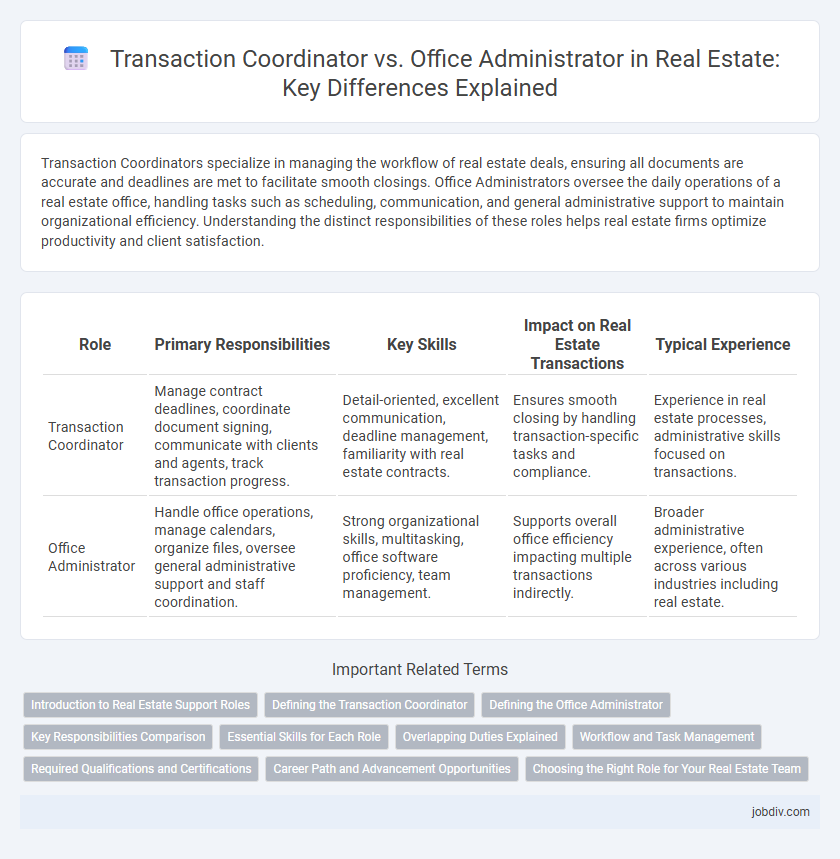Transaction Coordinators specialize in managing the workflow of real estate deals, ensuring all documents are accurate and deadlines are met to facilitate smooth closings. Office Administrators oversee the daily operations of a real estate office, handling tasks such as scheduling, communication, and general administrative support to maintain organizational efficiency. Understanding the distinct responsibilities of these roles helps real estate firms optimize productivity and client satisfaction.
Table of Comparison
| Role | Primary Responsibilities | Key Skills | Impact on Real Estate Transactions | Typical Experience |
|---|---|---|---|---|
| Transaction Coordinator | Manage contract deadlines, coordinate document signing, communicate with clients and agents, track transaction progress. | Detail-oriented, excellent communication, deadline management, familiarity with real estate contracts. | Ensures smooth closing by handling transaction-specific tasks and compliance. | Experience in real estate processes, administrative skills focused on transactions. |
| Office Administrator | Handle office operations, manage calendars, organize files, oversee general administrative support and staff coordination. | Strong organizational skills, multitasking, office software proficiency, team management. | Supports overall office efficiency impacting multiple transactions indirectly. | Broader administrative experience, often across various industries including real estate. |
Introduction to Real Estate Support Roles
Transaction Coordinators specialize in managing the documentation, deadlines, and communication required to successfully close real estate deals, ensuring compliance and smooth workflow. Office Administrators oversee broader daily operations within a real estate office, including scheduling, client relations, and organizational support to enhance overall efficiency. Both roles are integral to real estate teams, providing essential administrative and operational backing that streamlines processes and supports agents' productivity.
Defining the Transaction Coordinator
A Transaction Coordinator in real estate manages the administrative tasks involved in closing deals, such as organizing documents, scheduling inspections, and ensuring compliance with deadlines. This role serves as a critical link between agents, clients, and third parties to streamline the transaction process and reduce errors. Unlike an Office Administrator who handles overall office management, the Transaction Coordinator focuses exclusively on coordinating the details of real estate transactions.
Defining the Office Administrator
The Office Administrator in real estate manages daily operations including document handling, client communication, and team coordination, ensuring smooth office workflow. They support agents by organizing schedules, processing contracts, and maintaining compliance with industry regulations. Distinct from a Transaction Coordinator who focuses solely on closing deals, the Office Administrator oversees broader operational responsibilities across the entire office.
Key Responsibilities Comparison
Transaction Coordinators manage the entire real estate transaction process, including contract preparation, timeline tracking, and communication between buyers, sellers, and agents to ensure smooth closings. Office Administrators oversee daily operations within the real estate office, handling tasks like scheduling, file management, and staff coordination to maintain organizational efficiency. While Transaction Coordinators focus on compliance and transaction-specific details, Office Administrators prioritize office workflow and administrative support.
Essential Skills for Each Role
Transaction Coordinators excel in contract management, attention to detail, and communication skills to ensure seamless real estate closings. Office Administrators require strong organizational abilities, proficiency in office software, and multitasking to manage daily operations and support staff efficiently. Both roles demand time management, problem-solving, and interpersonal skills, but their focus varies between transactional processes and overall office functionality.
Overlapping Duties Explained
Transaction Coordinators and Office Administrators both manage essential paperwork and communication flows in real estate, ensuring smooth operations from contract to closing. Transaction Coordinators primarily focus on coordinating contract details, deadlines, and compliance requirements, while Office Administrators oversee broader administrative tasks such as scheduling, office management, and supporting multiple agents. Their overlapping duties include document preparation, client communication, and database management, highlighting the importance of collaboration to maintain transaction accuracy and efficiency.
Workflow and Task Management
Transaction coordinators specialize in managing the detailed workflow of real estate deals, including document preparation, deadline tracking, and communication between agents, clients, and vendors to ensure smooth transactions. Office administrators oversee broader operational tasks such as office management, staff coordination, and maintaining records, which support the overall efficiency of the real estate office. Workflow in transaction coordination is project-specific and deadline-driven, while office administration involves managing ongoing administrative processes and resource allocation.
Required Qualifications and Certifications
Transaction Coordinators typically require a background in real estate, strong organizational skills, and familiarity with contract management software, with certifications like the Certified Transaction Coordinator (CTC) enhancing their qualifications. Office Administrators in real estate must possess proficiency in office management, communication, and multitasking, often benefiting from certifications such as the Certified Administrative Professional (CAP) or industry-specific courses. Both roles demand knowledge of compliance and real estate regulations, but Transaction Coordinators prioritize contract-specific expertise while Office Administrators focus on broader operational support skills.
Career Path and Advancement Opportunities
Transaction Coordinators specialize in managing real estate contracts and ensuring seamless deal closures, often advancing to roles such as Senior Transaction Coordinator or Real Estate Operations Manager by gaining expertise in compliance and client relations. Office Administrators oversee administrative functions, supporting multiple agents and office systems, with career growth leading to positions like Office Manager or Real Estate Business Coordinator by developing leadership and organizational skills. The career path for Transaction Coordinators is more transaction-focused, while Office Administrators have broader operational opportunities, both offering advancement through increased responsibilities and industry knowledge.
Choosing the Right Role for Your Real Estate Team
A Transaction Coordinator specializes in managing contract deadlines, document compliance, and communication between buyers, sellers, and agents to ensure smooth real estate closings. An Office Administrator handles broader office operations, including team scheduling, client database management, and financial record keeping to support overall business productivity. Selecting the right role depends on your team's size, transaction volume, and whether you need focused contract management or comprehensive administrative support.
Transaction Coordinator vs Office Administrator Infographic

 jobdiv.com
jobdiv.com